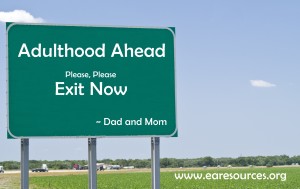This winter’s weather has definitely been difficult. Most of the United States has been under extremely cold weather conditions, it is currently snowing again in my home state of Minnesota.
One city that made recent news is Atlanta. As a snow storm entered their city, the city officials did not adequately prepare for an evacuation of their city. City officials knew the storm was coming, but failed to plan. This lack of planning caused widespread confusion and chaos.
As a parent, do you have an evacuation plan for your emerging adult? The day is coming when they will need to embrace adulthood. Do you know what it will take to prepare them to leave the home in a healthy manner.
The primary goal for parents should not be to have an empty nest. It is also not always more healthy or godly for emerging adults to move out. In Bible times, families often lived under one roof. It is only among affluent nations in more recent times that moving out has become so tied with reaching adulthood.
Becoming an adult is more than moving out of their parents’ home, Emerging adults need to accomplish three tasks: Vocation, Autonomy, Community. In order to achieve a successful evacuation from your home, here are three areas to develop your E-VAC plan (Vocation, Autonomy, Community).
1. Vocation
 The childhood question, “What do you want to be when you grow up?” becomes central in the mind of emerging adults. Vocation is the means by which the individual fulfills purpose in their life. Emerging adults are seeking to discover vocation that gives them purpose and provides a place in the bigger picture of life.
The childhood question, “What do you want to be when you grow up?” becomes central in the mind of emerging adults. Vocation is the means by which the individual fulfills purpose in their life. Emerging adults are seeking to discover vocation that gives them purpose and provides a place in the bigger picture of life.
Parents must step forward to prepare them for the journey ahead. How are we equipping our child to find purpose and provide for themselves?
Parents need to ask themselves how they can assist their child to move forward towards discovering their vocation. Providing them opportunities for skills development, occupational exploration, work experience, and role models are a few things that parents can do to help them develop.
Other parents do too much. If you are filling out job applications, then you are doing too much. You have crossed the line, if you are filling out their college applications. There is a balance to be found between directing their educational and vocational decisions, and yet letting them stand autonomous which is our second area of development for a healthy evacuation.
2. Autonomy
The second developmental task of adulthood is to establish autonomy. Autonomy can be defined as the ability to make one’s own decisions and to deal with the consequences. An individual must break their dependency upon other humans (usually parents, but it could be anyone), and make decisions that are their own.
Parents need to allow their child’s autonomy, and to encourage them as they develop. They can do this through releasing children to make decisions, working alongside them in the decision-making process, allowing children to pay for the consequences of the decisions.
3. Community
Community is essential to becoming an adult, and an individual’s further development. Western culture tends to support independent living, but biblical principles support inter-dependent living. God created humans for community with Him, and with one another.
Parents should seek to equip adolescents with the skills to seek and develop community. These social skills are essential for the maturation process. They can do this through forcing children out of their social comfort zones, placing them in intergenerational environments, teaching them social skills.
Don’t be caught off guard. Get your E-VAC plan in place.
If you are interested in hosting a seminar for your church or school, on how to develop your own E-VAC plan, please contact Dr. G. David Boyd at gdavid@earesources.org.








![girl-woman-hair-1276336-l[1]](http://www.earesources.org/wp-content/uploads/2013/09/girl-woman-hair-1276336-l1-203x300.jpg)
![589707_49030396[1]](http://www.earesources.org/wp-content/uploads/2013/08/589707_490303961-239x300.jpg)
